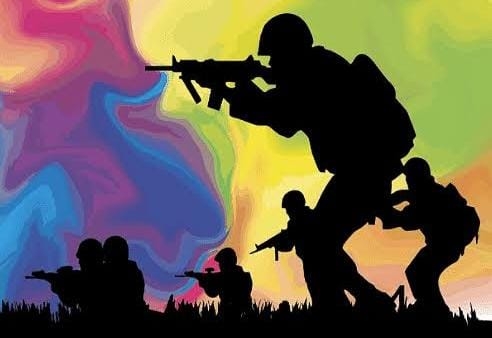India's Internal Security : Threats and Challenges
It is very obvious that with increasing power, a nation’s internal security has its new threats. Kautilya wrote in the Arthashasha that a state could be at risk from four different kinds of threats - internal, external, externally aided internal, and internally aided external. Quite literally current internal security scenario of India has a mix of all the shades of threats visualized by Chanakya.

It was a fine winter Valentine's Day morning in 2019. As commuter travel to work, the flower shops were filled with roses, especially red roses to sell. Suddenly, a student sitting inside Delhi Metro whispered WHAT? The notification of a news application popped up, which stated, “Over 40 soldiers killed in Pulwama district, targeted by a suicide bomber.
Another notification popped up with headline stated, “Valentine's Day (February 14, 2019) turned BLACK DAY for India. In few minutes it was clear that the country has become a victim of a co-ordinated terrorist attack – one of the biggest threats to the internal security of the nation. This incident shocked India to its core and raised many questions, from internal security to the credibility of intelligence agencies.
It is very obvious that with increasing power, a nation’s internal security has its new threats. Kautilya wrote in the Arthashasha that a state could be at risk from four different kinds of threats - internal, external, externally aided internal, and internally aided external. Quite literally current internal security scenario of India has a mix of all the shades of threats visualized by Chanakya.
According to the 43rd Report to the concerned Parliamentary Standing Committee, the Ministry of Home Affairs has brought out, “210 out of the 535 districts in the country are affected by serious internal security problems or public disorders, and almost 40 percent areas facing serious disorder of one or other kind.” The definition as well as challenges to the internal security of the country is too dynamic in present time. Now it's not just in Borders, it has paved its way beyond that.
INDIA - 13TH OUT OF 163 COUNTRIES IN GTI
According to ‘Global Terrorism Index 2023’ India holds the 13th rank among 163 countries of the world. This report states that more than 43 terror groups are internally operational in India.
This makes terrorism the biggest out of all threats to India’s internal security. The terrorist are opposed to the very idea of India. They want to destroy India's icon & symbols. I am saying this because,
- They cause explosion in Delhi because it is the capital of India.
- They attack Mumbai because it is the commercial hub of India.
- They are active in Bengaluru and Hyderabad because these cities are IT hubs of India.
- They are perpetrating violence in places like Ayodhya, Kashi etc. because these are believed as holy cities by Hindus.
- In a nutshell, they want to destroy India politically, economically and socially.
The mindset is best revealed in the speeches of Hafiz Mohammed Saeed, the chief of Lashkar-e-Taiba, who openly declared: “The jihad is not about Kashmir only... About 15 year ago, people might have found it humorous of ridiculous if someone had told them about the disintegration of USSR. Today. I announce live break-up of India, Insha Allah. We will not rest until the whole (of) India is dissolved into Pakistan.”
In order to deal with such organisations and mindsets, a strict ‘Anti-Terror policy’ would needed to be defined on a priority. The Anti-Terror laws need to be more stringent.
Beside this dependency on the objectives of the groups, the nature of terrorism also differs, such as ethno-nationalist terrorism, religious terrorism, left wing extremism, state sponsored terrorism, cyber, urban including Narco terrorism etc. All these are making terrorism even more challenging to ensure internal security.
FOURTH GENERATION WARFARE – PSY-WARS & PSY-OPS
As conventional war is not resulting in desired result, the negative element went for opting other ways like Psy-Wars (psychological war). This is the Fourth Generation warfare, which is disturbing the civil fabric of nation, and which is replacing the concept of conquering the land by the concept of controlling the minds of civil society using Psy-ops, i.e., psychological operations.
Such challenges to the internal security can be increase to multiple folds. Therefore, not only the border management but also the cyber security must be the priority of the government. We need to understand that the 6-inche smart phone and it's applications with unfiltered circulation of highly edited fake data are enough to disturb the civil fabric and to propagate the psychological war.
COMMUNALISM OVER NATIONALISM
Communalism, allegiance to one's own ethnic or religious group than to the wider society is also observed as the threat to the national security. Communalism implies to blind allegiance to one's own communal group - religious, Ethnic, linguistic etc. rather than a large society or nation as a whole. In its extreme form it manifests in the form of hatred & hostility.
To tackle this, strong legal action along with the policy of ‘zero tolerance’ towards the violence will bring down the Communal hatred and impartial administration.
The over diverse culture of India is at some time considered Boon and bare. The concept of ‘Unity in Diversity’ shackled when this diversity becomes the basis of the feeling of jealous & hatred.
INHERITED PROBLEMS TO THE INTERNAL SECURITY
India, as a nation, tasted the independence at the cost of its division on religious basis. The division of pre-independence India into two nations resulted in an unforeseen violence at very large scale. But later things became complicated internally too.
Over the years, challenges to the India's Internal Security have been multiplied much more times. The linguistic riots and Inter-state disputes were inherited. But now the Trans-national organised criminals/mafias have given further boost to the international terror.
Their “modus operandi” is now smuggling of weapons and drugs, Hawala transactions, money laundering, and pumping the fake currency notes. All these are some new challenges to the internal security of nation.
CYBER WARFARE
Our vital installations are now based on cyber-system. Any failure to check the cyber-attacks could be fatal to our economy & security. The Snowden revelation (Wikileaks) 2013 has exposed the extent of espionage possible through cyber network.
There are also some non-military and non-traditional threats to security. These include climatic Security, diseases of epidemics, Bioweapon war, energy & water, food issues, resource wars, poverty & economic disparity etc.
ABSENCE OF INTERNAL SECURITY DOCTRINE
American diplomat Henry Kissinger said that the purpose of a doctrine is to translate power into policy. Strangely, even after seven decades of independence we are still lagging or careless to codify Internal Security Doctrine.
The doctrine would necessarily have inter alia political, socio-economic, intelligence & border management angles.
A secessionist movement, as a matter of principle will here to be put down with heary hand.
Ethnic demand would deserve a sympathetic response unless that leads to excessive fragmentation.
From socio-economic point of view government would have to see / look after genuine grievances — like, are people unhappy because of unemployment.
Co-ordination of intelligence agencies with friendly countries. The Internal Security Doctrine Should have both defensive & offensive capabilities. The border management needs to be handled from multiple dimensions. Furthermore, coastline of 5422 km and additional island coast line of 2094 km need to be effectively guarded.
URGENCY OF POLICE REFORMS IN INDIA
The Malimath Committee made comprehensive recommendation to overhaul the criminal justice system. Unfortunately, these were trashed because of opposition from the human rights lobbies. The Police, the prosecution machinery, the Judiciary, and the Jails all need comprehensive reforms.
Police reforms need to be taken up priority because it is first Security against all kinds of anti-social and anti-national elements. In a nutshell, the colonial police transformed into People's police - a police which upholds rule of law and is responsive to the grievances of Common man.
We have economic a strong military muscle and our economic strength is also steadily growing. What India needs especially at this moment, is the aggressive virtues, the spirit of soaring idealism, bold Creation, fearless resistance, courageous attacks of the passive tamasic (dark) Spirit. What we need, what we should learn above all things is to dare, again to dare and still to dare.
Article by
Shubhangini Dubey
Younginker
Bhopal, Madhya Pradesh


